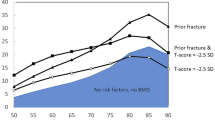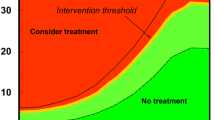Abstract
The T-score is well known to anyone working in the field of bone densitometry. It is the primary output from a bone densitometry system and is most often used for diagnosis of osteoporosis and for making treatment decisions. Despite widespread acceptance of the T-score, most clinicians are unfamiliar with the historical evolution of the T-score as a clinical measure. Furthermore, evidence is mounting that the T-score is not the optimal diagnostic parameter for clinical decision making. Many additional risk factors have been reported which can be combined with bone density results to assess absolute fracture risk. This editorial provides an historical review of the T-score, followed by summary of the status of the T-score, and concludes with suggestions for the future use of the T-score in bone densitometry.


Similar content being viewed by others
References
Watts NB (2002) T-scores and osteoporosis. Menopause Med 10:1–4
The WHO Study Group (1994) Assessment of fracture risk and its application to screening for postmenopausal osteoporosis. World Health Organization, Geneva
Kanis JA (1994) Assessment of fracture risk and is application to screening for postmenopausal osteoporosis: synopsis of a WHO report. Osteoporos Int 4:368–381
Kanis JA (2002) Diagnosis of osteoporosis and assessment of fracture risk. Lancet 359:1929–1936
National Osteoporosis Foundation (1998) Physician’s guide to prevention and treatment of osteoporosis. National Osteoporosis Foundation, Washington, DC
Lenchik L, Leib ES, Hamdy RC, Binkley NC, Miller PD, Watts NB (2002) International Society for Clinical Densitometry Position Development Panel and Scientific Advisory Committee. Executive summary. International Society for Clinical Densitometry position development conference. J Clin Densitom 5 (Suppl):S1–S3
Cummings SR, Black DM, Nevitt MC, Browner W, Cauley J, Ensrud K, Genant HK, Palermo L, Scott J, Vogt TM (1993) Bone density at various sites for prediction of hip fractures. Lancet 341:72–75
Gardsell P, Johnell O, Nilsson BE (1989) Predicting fractures in women by using forearm bone densitometry. Calcif Tiss Int 44:235–242
Wasnich RD, Ross PD, Davis JW, Vogel JM (1989) A comparison of single and multi-site BMC measurements for assessment of spine fracture probability. J Nucl Med 30:1166–1171
Smith DM, Khairi MRA, Johnston CC (1975) The loss of bone mineral with aging and its relationship to risk for fracture. J Clin Invest 5:311–318
Cummings SR, Black DM, Nevitt MC, Browner WS, Cauley JA, Genant HK, Mascioli SR, Scott JC, Seeley DG, Steiger P, Vogt T (1990) Appendicular bone density and age predict hip fracture in women. J Am Med Assoc 263:665–668
Ross PD, Davis JW, Epstein RS, Wasnich RD (1991) Pre-existing fractures and bone mass predict vertebral fracture incidence in women. Ann Intern Med 114:919–923
Hui SL, Slemenda CW, Johnston CC (1988) Age and bone mass as predictors of fracture in a prospective study. J Clin Invest 81:1804–1809
Pocock NA, Sambrook PN, Nguyen T, Kelly P, Freund J, Eisman JA (1992) Assessment of spinal and femoral bone density by dual X-ray absorptiometry: comparison of Lunar and Hologic instruments. J Bone Miner Res 7:1081–1084
Greenspan SL, Maitland-Ramsey L, Myers E (1996) Classification of osteoporosis in the elderly is dependent on site-specific analysis. Calcif Tissue Int 58:409–414
Faulkner KG, Stetten E von, Miiller P (1999) Discordance in patient classification using T-scores. J Clin Densitom 2:343–350
Faulkner KG (1998) Bone densitometry: choosing the proper skeletal site to measure. J Clin Densitom 1:279–285
Faulkner KG, Roberts LA, McClung MR (1996) Discrepancies in normative data between Lunar and Hologic DXA systems. Osteoporos Int 6:432–436
Looker AC, Orwoll ES, Johnston CC Jr, Lindsay RL, Wahner HW, Dunn WL, Calvo MS, Harris TB, Heyse SP (1997) Prevalence of low femoral bone density in older U.S. adults from NHANES III. J Bone Miner Res 12:1761–1768
Looker AC, Wahner HW, Dunn WL, Calvo MS, Harris TB, Heyse SP, Johnston CC Jr, Lindsay R (1998) Updated data on proximal femur bone mineral levels of US adults. Osteoporos Int 8:468–489
Steiger P (1995) Standardization of spine BMD measurements. J Bone Miner Res 10:1602–1603
Hanson J (1997) Standardization of femur BMD. J Bone Miner Res 12:1316–1317
Genant HK, Grampp S, Gluer CC, Faulkner KG, Jergas M, Engelke K, Hagiwara S, van Kuijk C (1994) Universal standardization of dual X-ray absorptiometry: patient and phantom cross-calibration results. J Bone Miner Res 9:1503–1514
Faulkner KG, Orwoll E (2002) Implications in the use of T-scores for the diagnosis of osteoporosis in men. J Clin Densitom 5:87–93
FDA Radiological Devices Panel Summary, 17 May 1999 http://www.fda.gov/cdrh/rdp.html, Accessed 20 March 2004
Black DM (2001) A proposal to establish comparable diagnostic categories for bone densitometry based on hip fracture risk among Caucasian women over 65. J Bone Miner Res 16 (Suppl 1):S342
Black DM, Cooper C (2000) Epidemiology of fractures and assessment of fracture risk. Clin Lab Med 20:439–453
Faulkner KG (1998) Bone matters: Are density increases necessary to reduce fracture risk? J Bone Miner Res 15:183–187
Kanis JA, Black D, Cooper C et al. (2002) A new approach to the development of assessment guidelines for osteoporosis. Osteoporos Int 13:527–536
Author information
Authors and Affiliations
Corresponding author
Rights and permissions
About this article
Cite this article
Faulkner, K.G. The tale of the T-score: review and perspective. Osteoporos Int 16, 347–352 (2005). https://doi.org/10.1007/s00198-004-1779-y
Received:
Accepted:
Published:
Issue Date:
DOI: https://doi.org/10.1007/s00198-004-1779-y




